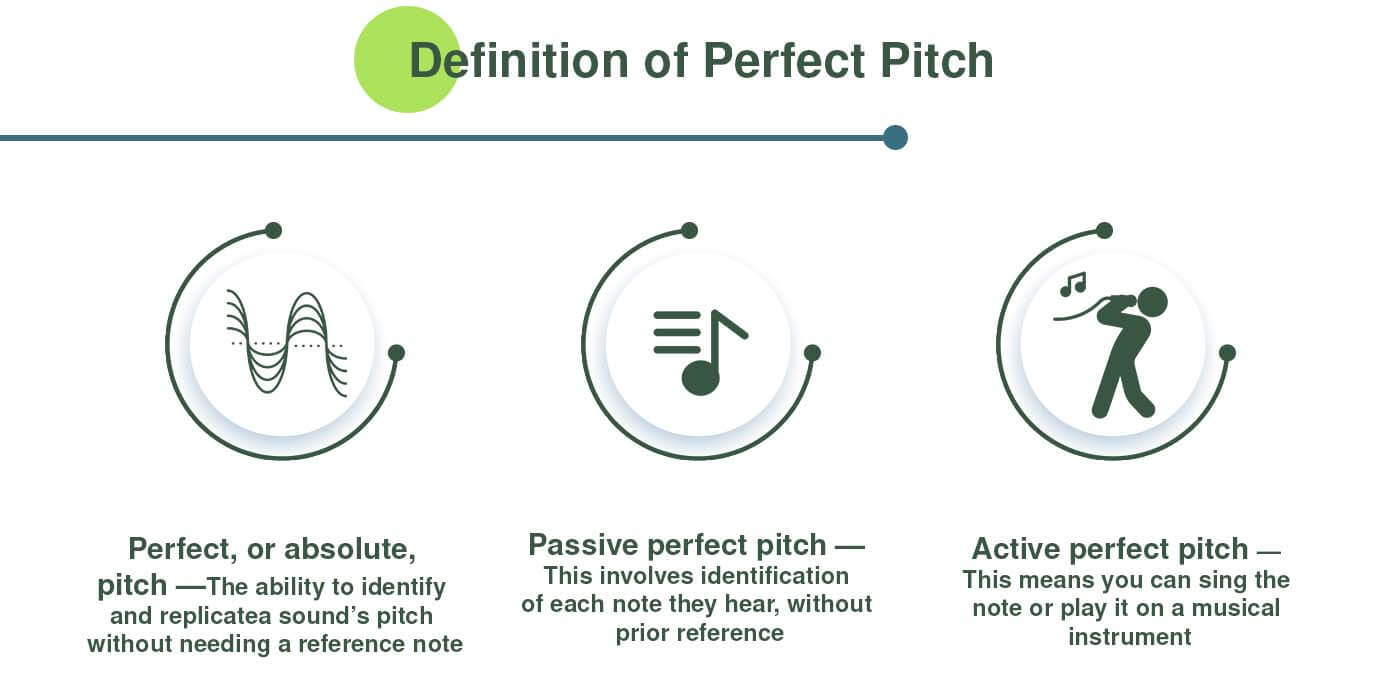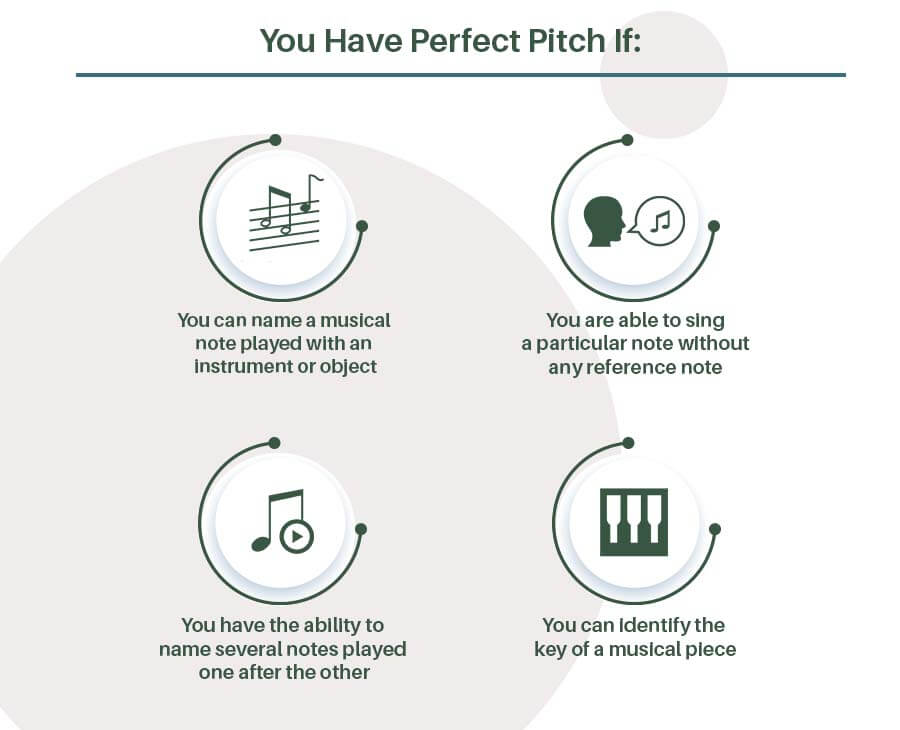The term “pitch perfect” is bandied about, most often by musicians and singers—but what does it mean to sound pitch-perfect, and is there a test for it?
This seemingly natural ability to hit perfect pitch is amazing or frustrating, depending on whether or not you have it. Let’s look at how it works and if you can learn it.
Key Takeaways: Perfect Pitch Test
- Perfect pitch, or absolute pitch, is a rare skill where you can pick out and sing or play a pitch without a reference note to help you.
- It differs from relative pitch, which involves determining differences between notes.
- Pitch identification is easier to learn from a young age, but can be learned.
- People who speak tonal languages or are on the autism spectrum may have perfect pitch come to them more easily.
- A serious difficulty in improving your musical abilities may indicate a hearing impairment.
What Is Perfect Pitch?
The definition of perfect pitch, or absolute pitch, is the ability to identify and replicate a sound’s pitch without needing a reference note. Passive perfect pitch involves identification, while active perfect pitch means you can sing the note or play it on a musical instrument [1].
Perfect Pitch: Definition

Perfect pitch has a loose definition, with differing degrees of difficulty. Some define it as being able to reproduce any musical tone without having listened to music recently. Others include people who can recognize and replicate pitches on familiar instruments, for example, if you play the piano [1].
Perfect vs. Relative Pitch
Perfect pitch comes at the cost of relative pitch. Relative pitch which means you are able to identify differences between sounds. However, people with perfect pitch can use their awareness of each individual tone to compensate, by working out the difference from there [1].
Is Relative Pitch Important?
In many languages, including English, using relative pitch tone is important to express meaning, such as asking a question. As for music, relative pitch can help you determine intervals and play by ear [1].
How Do You Get Perfect Pitch?
Some believe that perfect pitch is a genetic trait, as twins may be more likely to share it. Almost half of participants in a survey of college students with perfect pitch had a first-degree relative with the same skill, but only 14% of those without the skill had a relative with the ability.
Additionally, they found that 40% of those who started music lessons before the age of nine developed perfect pitch, while only 3% who began after nine years old had it. These results don’t confirm or rule out genetics as the only cause of perfect pitch [1].
Your hearing ability also affects your accuracy in absolute or relative pitch, so taking a hearing test frequency exam may be helpful if you suspect a sensory impairment.
How Rare Is Perfect Pitch?
Perfect pitch is a rare ability among the general population. Estimates put the average prevalence at 1 in 5,000 to 1 in 10,000 people. To picture it, we can expect Miami (total metro area) to have just over 600–1200 people with perfect pitch. Croatia would have 410–830 people with perfect pitch. However, estimates of 0.5–1% have been made for student musicians in colleges such as Yale [2].
Does Perfect Pitch Require Musical Training?
Developing perfect pitch later in life requires specific training. A 2019 study, one of the first to train adults in absolute pitch, used speed and accuracy tests designed to teach the ability to determine the correct key or musical note played without assistance. All had years of training [3].
If you don’t know where you stand with pitch, or want to be a better musician, a tone deaf test can help measure where you’re at.
Can You Develop Perfect Pitch as an Adult?
Adult musicians are able to develop perfect pitch. Previously, there was the theory of a “critical period”, where a musician had to train from early childhood to achieve absolute pitch.
However, the small study showing that you can learn perfect pitch as an adult found no sign of innate ability. Those with musical training had the opportunity to start subconsciously associating each note with its name and match it, but this didn’t happen on its own [3].
Does Ear Training Really Work?
Ear training can be effective. A study found increasing accuracy over an eight-week period, where volunteers were trained to identify a given musical note played from a piano. This was more effective than previous attempts at training people to identify musical notes without a reference tone after just one lesson [3].
How Do You Know If You Have Perfect Pitch?

You may have realized that you have perfect pitch without even asking an expert in music. Perhaps you can hear a song on the radio, identify notes played, and then re-create the musical piece without a score sheet. Maybe you’re a teacher, and you can tell when a student is playing the wrong key without looking at their fingers.
How Do You Know If You Have a Hearing Impairment?
Your inability to identify a musical key may not be down to a cognitive skill. You may have a hearing impairment, particularly if you are older or have been exposed to frequent loud noise. If using a reference note or regular practice isn’t helping, there may be an issue with your hearing.
Searching for the best online hearing test can be a helpful way to start if you suspect a hearing impairment. If ringing in your ears gets in your way, a tinnitus test may be helpful, too.
How Can You Get a Perfect Pitch Test?
There are a number of perfect pitch tests available for free online, which may give you a general idea of your abilities. If you attend music classes, you may have access to a professionals-only test through your teacher, or they could point you towards the best free test.
What Is a Pitch Sensitivity Test?
Pitch sensitivity is your accuracy when it comes to identifying the right musical tones, so a pitch sensitivity test will measure this ability [4].
FAQ
What are the most important things to know about perfect pitch?
What Is the Meaning of Pitch?
Pitch is the tone of a musical note, measured in hertz or described by its note name on a musical instrument, such as C sharp.
Can Perfect Pitch Be Learned?
Early research is discovering that even adults are able to learn perfect pitch, whether or not they were long-term music students. As people with autism have a greater ability to hone in on small details and categorize information, it may be easier for you if you are on the autism spectrum [4].
Who Has Perfect Pitch?
A lucky few people, between 1 in 5,000 and 1 in 10,000 among the population, and up to 1% of college musicians, have perfect pitch. People who speak tonal languages such as Mandarin may be more likely to have perfect pitch, too [2].
What Famous People Have Perfect Pitch?
A few celebrities in the music world have perfect pitch, including Mariah Carey and Charlie Puth. Going back a little further, Michael Jackson, Ella Fitzgerald, and Bing Crosby had it, too.
Conclusion
Perfect pitch is a rare ability to hear and replicate music notes and pieces, but can be learned with time and practice. Even if you never develop the skill, you can still be a great musician, as most of those who have achieved fame do not possess it.
However, serious difficulties with translating your music theory skills into practice may indicate a sensory impairment; in this case, it’s advisable to seek out the best online hearing test and avoid being too hard on yourself.
References:
- Moulton, Calum. “Perfect pitch reconsidered.” Clinical medicine (London, England) vol. 14,5 (2014): 517-9. doi:10.7861/clinmedicine.14-5-517
- Ross, David A et al. “Absolute pitch: music and beyond.” Epilepsy & behavior : E&B vol. 7,4 (2005): 578-601. doi:10.1016/j.yebeh.2005.05.019
- Van Hedger, Stephen C et al. “Absolute pitch can be learned by some adults.” PloS one vol. 14,9 e0223047. 24 Sep. 2019, doi:10.1371/journal.pone.0223047
- Bonnel, Anna et al. “Enhanced pitch sensitivity in individuals with autism: a signal detection analysis.” Journal of cognitive neuroscience vol. 15,2 (2003): 226-35. doi:10.1162/089892903321208169





Leave a Reply